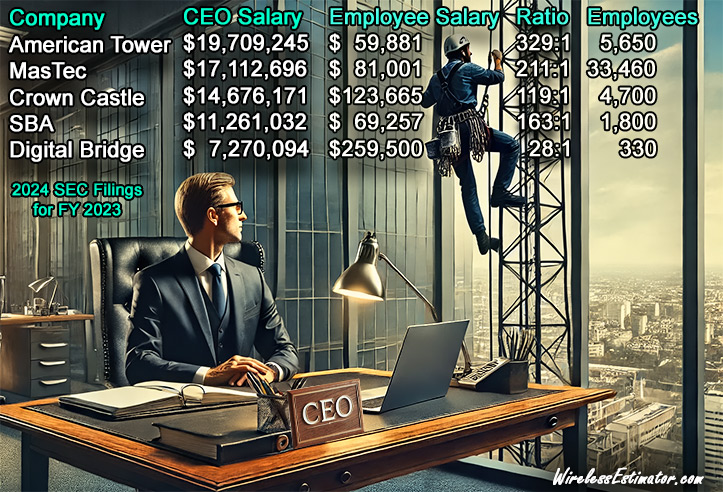
American Tower’s CEO has the industry’s highest salary at $19,709,245, while its employees—compared to other public companies in the U.S. such as MasTec, Crown Castle, and SBA Communications—receive the lowest salary at $59,881. Conversely, a DigitalBridge employee’s median annual salary is $259,500, while its CEO’s salary is the lowest in the executive group, with $7,270,094. (SEC-required company profiles of CEO and employee renumeration for 2023 are in the above graphic)
The annual Securities and Exchange Commission’s requirement for publicly traded companies to disclose the CEO’s salary and the median salary of their employees is intended to provide transparency and offer insights into income inequality within a company.
However, whether these 2023 filings accurately portray the company depends on several factors, and there are certainly ways in which these figures can be misinterpreted.
If a company has a large number of high-earning executives or specialized professionals, the median salary could be significantly higher than what most rank-and-file employees earn, as in the DigitalBridge salary, where it is clear that an administrator is not earning six figures.
This might create the impression that the company’s general workforce is better compensated than it actually is. These figures alone don’t provide context on employee benefits, stock options, bonuses, or other forms of compensation that might significantly affect the overall compensation package.
As an employee of DigitalBridge subsidiary Vertical Bridge informed Wireless Estimator, “My compensation allows me to enjoy a nice lifestyle in South Florida, enough to support my wife and two small children. However, as they report, I can assure you it is not above a quarter million dollars,” jokingly questioning, “Maybe I should ask for a raise?”
Public companies often view the requirement to report median salaries as potentially misleading, administratively burdensome, and of limited value to stakeholders. They perceive it as an unnecessary government oversight that does not benefit employees due to skewed median averages.


















